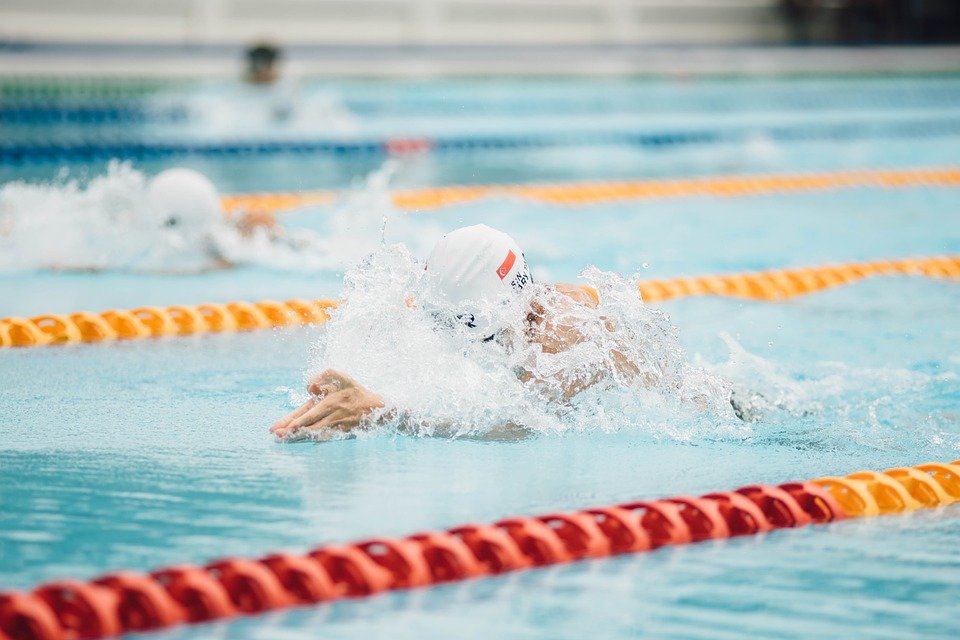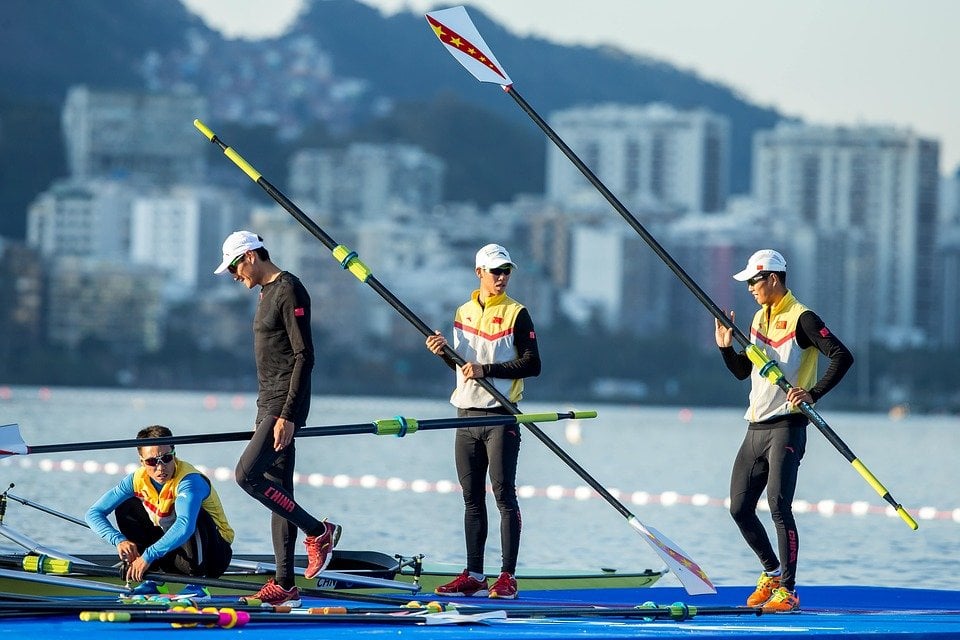How to Volunteer in Tokyo at the 2021 Olympics

You’ve sat on the edge of your seat at home as the likes of Usain Bolt or Allyson Felix take it to the wire with a sprint finish amid roaring cheers in the athletics stadium. You've marveled at the gravity-defying leaps of world-class gymnast Simone Biles. But have you ever wondered what it would be like to actually be there, watching as history is made before your eyes?
It might sound like an unlikely scenario, but every four years, close to a hundred thousand volunteers from across the globe are hand-picked to help out at the Olympics and Paralympics. Each and every one is an integral cog in the mammoth workings of the event, helping to ensure that as 'the Games' swing into action, everything runs like a well-oiled machine.
Even better, applications are open to everyone across the world and the opening date to get yours in for Tokyo 2021 Olympics open mid-September of this year. Before you get yourself into the running, read on for an essential guide to applying to become an Olympics volunteer.
Table of Contents
- Why Volunteer at Tokyo 2021?
- Who Can Volunteer at the Tokyo Olympics?
- How Much Does it Cost to Volunteer for the Olympics?
- How to Apply to Volunteer at the Tokyo Olympic & Paralympic Games
- Tips for Acing the Olympics Volunteer Application Process
- Different Volunteer Opportunities Available During the Olympics
- How to Fundraise for Volunteering at the Olympics
- Final Tips for Volunteering at the Tokyo Olympics in 2021
Why Volunteer at Tokyo 2021?
For the 16 days of the Olympic and Paralympics Games, over 4.8 billion people -- yes, let’s repeat that -- over 4.8 billion people watch from home. If you throw your hat into the ring and apply to become a volunteer in Tokyo at the 2021 Olympics, you can find yourself in the unique position of actually taking part. If you want to talk about once-in-a-lifetime volunteer experiences, few even come close to comparing with this.
What’s more, the experience of volunteering at the Olympics isn’t just about watching the Games, mingling with the athletes or thriving on the uber-positive vibes that the event exudes from every pore. As volunteers come from all walks of life, taking part is as much about cultural-exchange and cultivating the Olympic spirit, as it is about the sports events. Your time as a volunteer is the opportunity to strike up friendships and promote fair competition and non-discrimination in sport and the wider world –- all crucial principles upon which the modern Olympics were founded.
It feels somewhat unnecessary to add –- but we'll do it anyway –- that volunteering in Tokyo in 2021 also means a truly unique opportunity to see this thronged, sparkling metropolis during the excitement of the Olympic Games (Tokyo hasn't hosted the Olympics since 1964!). Although, like a regular job, you’ll have set shifts for volunteering, you’ll, of course, have plenty of down time to use as you see fit.
Whether you grab tickets for the main headline events of the Games, choose to delve into the historic temples and districts of old Tokyo or simply use every opportunity to stuff yourself on plates of expertly-prepared sashimi, Japan’s cutting-edge capital is a travel experience that won’t disappoint.
Who Can Volunteer at the Tokyo Olympics?
The beauty of the Olympics is that literally anyone can apply for a volunteering role. In the 2016 Olympic Games held in Rio, eighty percent of the volunteers were from Brazil, while the other 20 percent came from 56 countries across the globe.
For Tokyo 2021, there are 80,000 volunteer jobs up for grabs. To be successful, the main pre-requisites are that you’re aged 18 by April 1, 2021, and have “permission to stay” in Japan for the duration of the Games. For U.S., Canadian, Australian, U.K., and Europeans citizens, this means getting the free, 90-day visa available to you when you arrive in the country. The Japanese Ministry of Foreign Affairs has up-to-date information for those traveling from other parts of the world.
Because of the range of nationalities arriving at the Games, volunteers who speak both English and another language are in strong demand, particularly as there are plenty of volunteering roles available to communicate with athletes and dignitaries who don’t speak Japanese or English.
Previously volunteers have also been told that applicants who indicate on their form that they are available for both of the Olympics and the Paralympics are given priority when it comes to being assigned a role.
You also need at least a basic knowledge of the Olympics and Paralympics and why they’re such a significant global event. Before you apply, indulge in watching clips of past triumphs to get you up-to-date.
How Much Does it Cost to Volunteer for the Olympics?

Like most volunteering opportunities, helping out at the Olympics does have some related costs.
First up is the biggie: you will need to pay your own transport to/from Tokyo. Although it could be tempting to rush out and grab some cheap airfares before you even apply to volunteer, it's sensible to wait until you receive that all-important confirmation email that indicates you have been assigned a role. A thousand dollars out of pocket and no guaranteed volunteering job is not the way to get on-board with the Olympic spirit.
Next, is the issue of accommodation. At the PyeongChang Winter Olympics in South Korea in early 2018, volunteers were put up for free in nearby hostels, hotels, and student accommodation; in Rio 2016, volunteers were expected to find and pay for their own. The situation for the 2021 Olympics has yet to be confirmed, so be very aware when applying that you may not only be required to pay for your accommodation for the duration of the games but also have to find somewhere to stay, to begin with.
Periods of volunteering last at least ten, not necessarily consecutive, days, or twenty days if volunteering at the Olympics and the Paralympics. Consider when planning your trip that you’ll likely want at least a few days at the beginning or end of the trip for seeing the city.
Be aware that Tokyo is an expensive place to visit and a budget of at least $50-$80 to cover food and transport costs for any days off to go sightseeing should put you in good stead. Again, you may find that the organizers offer reduced transport costs for Olympics volunteers –- be sure to check this in the information pack you receive when you’re accepted to volunteer and budget accordingly.
Luckily, there are various things that are covered for successful volunteers. You can expect to receive your uniform (a great memento for the games) and free food and drink during your eight-hour shifts. Insurance for the activity you’re taking part in is also offered, although you’ll need to plan travel insurance for the time you spend outside of volunteering.
How to Apply to Volunteer at the Tokyo Olympic & Paralympic Games
While the full guidelines for applying to volunteer won’t be released until the end of July 2018, the following timeframes and information offer a good outline of what you can expect. Given that you apply a whole two years ahead of the event starting, it’s by no means a short and a sweet process; but, trust us, it’s definitely worth it.
Stick in there, don’t be afraid to chase up if you don’t hear back after a month or two at any stage of the process, and remember that, like any good Olympian, persistence and determination are key.
Application Timeline for Volunteering in Tokyo 2021
You might be surprised to learn that it takes almost two years for the entire Olympic volunteer application process!
- July 2018: Full guidelines for prospective applicants are released on the Tokyo 2021 website.
- Mid-September through early December 2018: Online applications are officially accepted for volunteering positions.
- January through July 2019: Applicants who are invited to an interview will be contacted. For those not living in Japan, these will be held via video call. Applicants who are successful will be alerted at some point during these months.
- October 2019: Training for those based in Japan begins.
- March/April 2021: Roles are assigned to volunteers and those with specialized or leadership roles begin their training (again, only for those based in Japan).
- June/July 2021: Volunteers arrive and training for overseas volunteers takes place.
- July 24, 2021: The Olympic Games begin!
Tips for Acing the Olympics Volunteer Application Process
To be successful with the application process, it’s important to consider volunteering at the Tokyo Olympics to be like any real job.
The organizers are looking for people with a passion for sports and working alongside others, plus enthusiasm and commitment. To be in with a great chance of joining the Olympic team, aim to demonstrate these skills in all stages of your application.
To truly shine and prove you deserve a gold medal for volunteering know-how, keep the following in mind :
1. Master the Application Form
The initial application form is very detailed and needs to be chock full of information about your skills, including any technical or professional ones you may have (e.g. medical, sporting expertise, media qualifications etc.), experiences of working in major national or international sporting events and your language capabilities. You’ll be also asked to discuss your work experience and assessors are looking for examples of when you've worked in a team. Be thorough in your answers and prove that you are the obvious choice of volunteer.
2. Ace the Group Interview
Interviews have traditionally been a group video call with other potential applicants, and will normally focus on questions about why you want to volunteer. The chance to spend two weeks watching the sports in Tokyo might seem like the obvious answer, but remember that they’re looking for enthusiastic, team players. Mention your love of meeting and sharing new cultures or the fact that you’re fanatical about athletics and want to share your passion with the crowds in the stadium.
Either way, prove that you see the Olympics are as much about the intercultural exchange as the chance for a trip abroad.
3. Demonstrate Your Enthusiasm
Ooze enthusiasm, a can-do attitude and the ability to be flexible. Things don’t always run as planned and they need volunteers who can manage in a changing environment.
4. Time Your Application for Maximum Chances of Selection
Although applications are received over a period of two and a half months, it can help to apply earlier rather than later. In your application, you’re asked to indicate preferences for which type of role you'd prefer to do and where, and applying earlier rather than later can increase your chances of grabbing the one you want.
That said, not everyone can get their first choice, so be ready to get sent to another part of the Games if need be.
Different Volunteer Opportunities Available During the Olympics

There are plenty of ways to volunteer in Tokyo and it’s worth reading through the full list to get a sense of what would be the best fit for you.
- Guidance: One of the first volunteers that spectators and athletes see when they arrive. In this role, you are on hand to help spectators at venues by checking tickets and assisting with security checks. You also may be sent to airports and hotels to pick-up and support athletes. Number of volunteers: 16,000 to 25,000
- Events: One of the more visible roles as you're based in the stadiums or venues where the events are held. Volunteers working in an events role are critical to ensuring that things go smoothly at the venues. Specific jobs can be varied and include both behind-the-scenes and in front of house roles. Number of volunteers: 15,000 to 17,000
- Mobility: This position makes sure that everyone is where they should be during the Games. You can expect to drive the vehicles that transport participants between venues. Number of volunteers: 10,000 to 14,000
- Personal support: This role is ideal for those who speak additional languages beyond English or Japanese. In this role, you'll be welcoming dignitaries from the 200 countries around the world that are competing in the games, as well as supporting athletes during their time in the Olympic Village and during media interviews. Number of volunteers: 8,000 to 12,000
- Operation support: This role plays an essential part in keeping the Games ticking along. You can expect to help manage logistics, including transportation of athletes, registering other volunteers and delivering equipment to athletes and their teams. Number of volunteers: 8,000 to 10,000
- Healthcare: For those with medical qualifications. Volunteers in a healthcare role act as first responders in the event of a medical emergency. They might also help to administer doping tests to athletes. Number of volunteers: 4,000 to 6,000
- Technology: For those with experience or skills in technology. In this role, you'll be entering data and event results at competition venues, as well as helping to manage other types of technology used during the events. Number of volunteers: 2,000 to 4,000
- Media: Help the logistical support of the world's media. If working in this position, you'll provide logistical and other support to the world media who are covering the games and be with them for both press conferences and during events. Number of volunteers: 2,000 to 4,000
- Ceremonies: Briefing winning athletes at awards ceremonies. You'll have a chance to talk directly to athletes as you are the person that medalists see before they go on the podium. Language skills are often required for this role. Number of volunteers: 1,000 to 2,000
- Volunteer lead positions: For those with experience of leading teams and volunteering at sports events. You are in charge of leading a team of volunteers in a particular area. You need to be able to respond flexibly to situations as they arise and be able to enthuse your volunteers. Number of volunteers: Unknown
If you can't tell from this list, there are a lot of opportunities, for a lot of volunteers to help make the Olympics happen!
How to Fundraise for Volunteering at the Olympics
Chomping at the bit and ready to get started with that application? Hold your horses! There’s the little question of funding your stay.
Never fear: as always, we’re a mine of information to help you turn volunteer pipe dreams into an in-the-middle-of-the-Olympics reality. The following strategies (plus these extra tips about fundraising for study abroad which are applicable here too) can get you well on your way to covering the costs.
Reach Out to Friends & Family
There’s probably no one who wants you to benefit from meaningful and life-changing experiences than your nearest and dearest, aka your friends and family. You can request that your next birthday present is magically transformed into a donation towards your trip or see if anyone is feeling particularly benevolent and wants to contribute out of the goodness of their heart.
Set Up a Fundraising Page
We’re big fans of Fund and Seek, a platform that allows you to set up a website for your fundraising campaign, share it with your supporters via social media and email and then watch as the donations roll in.
Even better, you can keep all of your benefactors up-to-date long after you’ve raised the money, making sure they're involved in the brilliant experiences you have as a result of their generosity.
Embrace Your Entrepreneurial Spirit
What better way to raise money to volunteer at the Olympics than with an Olympics themed event? We’re talking a bake sale with edible gold-medal cookies, donuts in the colors of the Olympics rings -- you get the picture.
Less handy when it comes to baking? How about a good, old-fashioned yard sale (decorated with blue, black, red, yellow and green bunting -- the Olympic colors, of course) where you can flog all the old items clogging up your garage and make a tidy mint to go towards the trip.
Harness Your Skills
Bit of a wiz when it comes to fixing computers or technology? Great at doing others’ hair and make-up? Speak another language? If any of these apply to you, consider selling your skills in return for donations to your volunteering trip.
Make sure to advertise what you can do to your friends, family, their friends, their family and your neighbors to drum up interest in what you’re offering. And don’t forget to tell them exactly what you’re raising the cash for; you might find they’re extra friendly in their payment.
Final Tips for Volunteering at the Tokyo Olympics in 2021
Inspired? You better be! Before you dash off, there are a few more things to keep in mind as you embark upon the long, perhaps slightly daunting, but absolutely worth it process of applying to volunteer.
- Part of the fun of volunteering at the Games is the chance to watch some of the events in the stadiums. To avoid disappointment, be sure to apply for tickets before arriving in the country (information about how to do so will be published closer to the event on the official Tokyo 2021 page). Tickets are always harder to get last-minute, and you’ll be able to request days off from your volunteering duties closer to the time.
- Pins showing your home country are a huge thing in Olympic volunteering circles. Bring a couple with you ready to swap with other volunteers; it’s a great way to go home with some truly unique souvenirs.
- Finally, remember to live in the moment! Few people ever get the chance to volunteer at the Olympics, so savor each and every minute.
Now we’ve covered all bases, there’s little more to say than... On your marks, get ready, set, GO!
